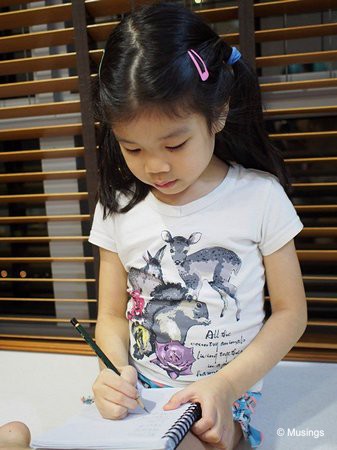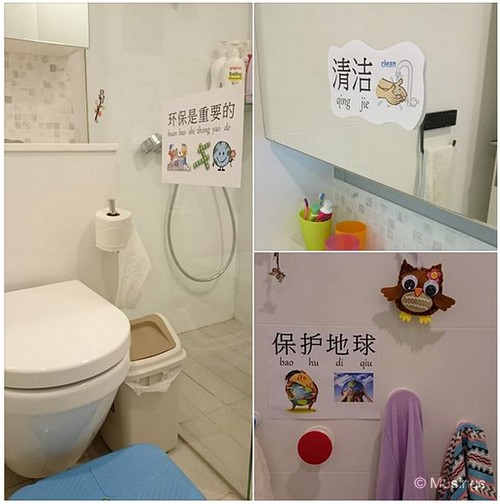Every week, Hannah at Kindergarten 2 has two spelling quizzes; Chinese spelling on Monday, and English spelling on Tuesday. Each quiz requires the kids to write several words – usually three for Chinese and five to six for English. Hannah often practices for them at her nanny’s, and also at home from the weekend onward. Hannah genuinely seems to enjoy school work. And getting the words mostly if not all correct at the quizzes is often a source of great pride for her. She’ll often gush with joy when she reports her results to us on Tuesday and Wednesday late afternoons when we pick her up, and we’ll also draw additional ‘stars’ and smiley faces in her report book as a reward for her.

Our girl normally does pretty well for English spelling, but Chinese spelling is a huge hit and miss. Like what Ling muses – Hannah simply doesn’t get sufficient Mandarin speaking practice at home. Mommy’s Mandarin is decent, while Daddy’s on the other hand is… – well, the less said the better! So Ling had a grand idea the other day: print the Chinese words of the week using that new Epson L550 printer, and put them up in her bathroom (of all places).

In both language cases though, Hannah still doesn’t take well to failure, and an early morning incident today brought this to the fore again. Today’s English spelling quiz involved the words: ‘lizard’, ‘caterpillar’, ‘worm’, ‘snail’, centipede’, and ‘spider’, and Hannah did her usual practices last night. This morning just before driving off from home, we got her to mentally rehearse the six words again – and when she had difficulties recalling how to spell ‘caterpillar’, we could see her tears starting to well-up. A quick reassurance and prompting helped her recall, but it reminded us of what her kindergarten teachers often share when we meet them: that our girl has very high expectations of herself and her work. Yes she takes pride, but she also gets super emotional at failures.
We’re not sure what to make of it, especially since Peter, even at just two years old, shows no such perfectionist tendencies. In fact, if nothing else, he has that curious if also destructive streak when he rampages about the house.
It’s indeed something to think of and reflect: on the one hand, we beam with pride when Hannah’s teachers share about Hannah’s academic accomplishments in class, her sociability and her natural leadership tendency to take charge, but are also a little worried if she doesn’t grow to better handle not being good at everything and failing as she grows older.
I’m quite proud of Hannah and her dedication!
The emotional impact Hannah appears to experience when facing less than successful outcomes is something I can well relate to. I was exactly the same. Looking back, it was obviously a self-inflicted heavy burden, one consisting of loads of despair and anxiety. I wouldn’t even begin to know how to deal with it as a parent. Love, acceptance, and encouragement, I suppose, and I’m more than sure she is provided with plenty of all three.
I don’t remember when, but eventually I grew less emotional when facing the prospect of reality vs self-expectation. It probably coincided with the ability to learn to laugh at myself and take things in stride. Or maybe my interests changed just enough to provide me a slightly different self image. I’m at a loss, but I would bet Hannah grows out of it.
That being said, I am a strong believer in the value of learning to experience failure and disappointment at a young age, when one can react and learn from it accordingly and under safer and less stressful circumstances. I can’t count the number of times I’ve seen high achievers collapse when confronting scholastic road blocks for the first time in their mid-to-late teens. For them things tend to come so easily as to allow them to get by without developing the required study skills to achieve success in higher education. It’s not a pretty sight.
Hi hi, great efforts for making use of home environment to teach Mandarin ! Keep it up :-) Just a suggestion, Use either 楷体 ( Kai it ) or 宋体 ( song ti ) as for some fonts certain strokes are written differently , this will make the children rather confused.
Hi Matt,
“I am a strong believer in the value of learning to experience failure and disappointment at a young age” – same here! :D
Recently, Hannah proudly informed us that she didn’t cry when she didn’t obtain full marks for a spelling test. And she let on that ‘but my friend cry’ to show us how strong she was! Well, I’ll take that with a pinch of salt. Lol.